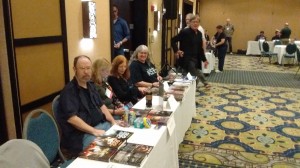I went to Capclave 2018 instead of Lost Weekend 10 because the two conflicted. And because I can’t hang. At least at Capclave I can go to sleep at a reasonable time and wake at a reasonable time and take breaks and eat and do all the things that a 30-movie 4-day marathon exclude. Yes, getting soft in my old age.
I showed up around 3 on Friday, Sep 28th, about an hour before the first seminars kicked in and threw my stuff in the hotel room. Nice place.  Then to it. The first thing I did was jump into a game of Valeria: Card Kingdoms,
Then to it. The first thing I did was jump into a game of Valeria: Card Kingdoms, 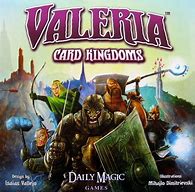
which I had never heard of but is now definitely on my list of games to get. It was fun and I think I was on my way to winning but had to move on to the seminars:
- The Business of Editing. Panelists: Elektra Hammond, David Stokes, Jack Skillingstead, Alex Shvartsman. This was fairly basic with a lot of time spent discussing the various types of editing, from developmental to copyediting. The editors on the panel tend to work with people they meet at conventions or through recommendations so if you’re looking for a job, start attending. David Brin put Skillingstead through the most extensive editing ever. Brin had put together an anthology with a positive take on the surveilled society and Skillingstead’s submission wasn’t all that upbeat. Sheila at Clarkesworld had him cut 5000 words out of a 15,000 word story and he had to admit, it was better. Stokes said a story can always be shorter. Always. There are “hang out” novels, read for the author’s voice, and no one really cares how long it is or if everything in it applies. John Irving is a good example. Hammond said she often gets manuscripts that are really first drafts; the story actually starts in Chapter 4. Stephen King had written Salem’s Lot chronologically and was told to switch the first and last chapters. Voila, best seller. Skillingstead used to take short stories and type them out so he could see what the author was doing without the distraction of the printed “magic.” When an author signs a contract, it’s an agreement to editorial direction. No one’s words are so precious they can’t be changed, although Skillngstead hates it when editors mess with his sentences. Shvartsman reads a submission to the point he knows whether it’s right for him. Gardner Dozois could tell from the first page. Generally you have about a page to catch the editor’s attention.
- Small Press Publishing. Panelists: Danielle Ackley-McPhail, David Stokes, Ian Randal Strock, Sean Wallace. Most of the editors admitted they fell into publishing unintentionally. For Stokes, it started as a joke he made to a friend who was writing a book, “If no one else is interested, I’ll publish it.” What helped push him into publishing was the job market for PhDs in History. The primary contact small publishers have is at conventions like Capclave. The slush pile is murder to the point that Strock finds it’s easier to get pitches from people attending. Advertising works, but none of the publishers could say which piece of it does. Small presses publish the novels from big time authors that their big time publishers reject. Readers love it when an author has a body of work. A publisher doesn’t print books; that’s the printers’ job. A publisher puts a logo on the cover telling the reader this book is worth their time. The big publishers are run by accountants now, not editors, which is why you see a flood of identical books at any given time. When a formula succeeds, such as Harry Potter, they jump on it.
- Dark Fantasy vs Horror. Allen L. Wold, Michelle Sonnier, Darrell Schweitzer, Hildy Silverman. Schweitzer stated it baldly: there’s no difference between the two except as a marketing ploy. If a distinction is to be made then horror has less hope while dark fantasy deals with evil. Actually, I think it’s easier than that. Horror deals with the real world (yes, yes, define “real”) while dark fantasy with imaginary ones. If Frankenstein is running around, then it’s horror. If Puck, then it’s fantasy. M. R. James felt that horror should be somewhat remote, set in your grandfather’s time and you’re hearing the story some years later. Dark fantasy is not necessarily trying to scare you, like horror is. And please don’t include slasher movies, which someone on the panel called, “fuck and die” movies. Charles Williams ran with C. S. Lewis and Tolkien and wrote horror stories that only work if you believe in Christianity. A story is an event in someone’s life while a novel is a time period.
- Writing Near Future Scifi. T. Eric Bakutis, David Bartell, David Walton, Carolyn Gilman.
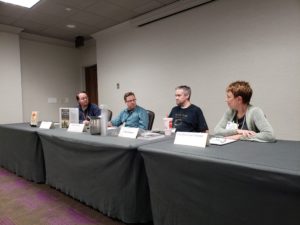
This turned out to be the best panel I attended the entire convention because it was free-wheeling and fun and it was more like a big discussion at a party than a lecture panel. Near Future scifi is the term replacing “mundane scifi,” I guess, because it deals with things as they are now, just taken a step further. I always defined mundane as scifi of the here and now, no FTL or galactic populations, and that pretty much is what we talked about. It is more a commentary about the world as it is, not what it can be. I buy that. Besides, writing mundane…er, near future…scifi is a lot easier than world building. Trust me. One of the panelists (regretfully I cannot remember who) said we are not in the Space Age, at least not any longer, because two guys with a canoe doesn’t make you a seafaring nation. So spot on. A guy in the audience said that Orwell did not anticipate we would actually like Big Brother. He wrote 1984 as a warning, not a prescription. The seminar then turned into a wide-ranging discussion about virtual reality, facial recognition technology, ads that social media offers and Amazon choosing your books for you. Very stimulating and lots of fun.
And on that note, I went to bed.
The next morning started out with some forgettable breakfast in the hotel’s restaurant and then on to:
- Writing Mixed Genres. Panelists: Jack Campbell/John Hemry, Brenda Clough, Andrew Fox, David Keener.
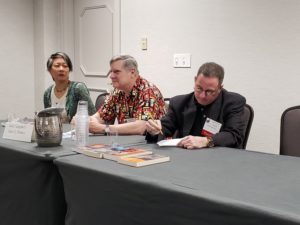 The opening statement: “Amazon has changed our lives.” BFO. Most writers believe they have an insight denied the common man so are given to such profundities. But the point is valid because Amazon means cross-genre books that no self-respecting publisher would touch are now all over the place. You can find My Little Pony post apocalyptic literature, tentacle porn, naked battle elves…any odd combination you can conceive or not has some representation there. Fun to write, as Fox (who has the best novel title in decades, Fat White Vampire Blues) said, but hell to market. Seriously. Where do you list Naked Battle Elves? Under fantasy? Sexual perverted fantasy, at that? Shake my head ruefully. Publishers see everything in black and white, not the subtle shades that indies do, which is why the same authors dominate the shelves in bookstores. Walk into any of them and you’ll find six different editions of Game of Thrones. Heinlein said the publishing game was rigged but the only way to win was to keep playing. About the only place to find indie book titles outside of Amazon are at indie bookstores. No kidding.
The opening statement: “Amazon has changed our lives.” BFO. Most writers believe they have an insight denied the common man so are given to such profundities. But the point is valid because Amazon means cross-genre books that no self-respecting publisher would touch are now all over the place. You can find My Little Pony post apocalyptic literature, tentacle porn, naked battle elves…any odd combination you can conceive or not has some representation there. Fun to write, as Fox (who has the best novel title in decades, Fat White Vampire Blues) said, but hell to market. Seriously. Where do you list Naked Battle Elves? Under fantasy? Sexual perverted fantasy, at that? Shake my head ruefully. Publishers see everything in black and white, not the subtle shades that indies do, which is why the same authors dominate the shelves in bookstores. Walk into any of them and you’ll find six different editions of Game of Thrones. Heinlein said the publishing game was rigged but the only way to win was to keep playing. About the only place to find indie book titles outside of Amazon are at indie bookstores. No kidding. - The Best of 2018. Panelists: Jim Freund, Jonathan Edelstein, A. C. Wise. Given the avalanche of possible reading material, both publisher and indie (see above), I attended this panel hoping to get some direction. Turns out this was a contest between all of the panelists about which of them was more hip to the Latest Thing. They did confirm a slightly distressing trend: translations are big. Specifically, translations from the Chinese. I’d already noticed that Chinese scifi stories were very much in vogue the last couple of years, especially in Clarkesworld. Last year’s Capclave seemed dedicated to it. Not that I’m opposed to Chinese scifi. Some of it is very good. But vogue tends to push out everything else and I wonder what I’m missing. Worse, it is cementing my suspicion that editors are making choices based on political correctness. As Wise said, it’s all about the color and sex of the writer. Since I’m the whitest straightest old guy in America, I haven’t got a prayer (that, and my crappy writing). Although, I am slightly Choctaw. My paternal grampaw and grandma were half Choctaw each, or some such combination (one of them may have been ¾, not sure) making my Dad a quarter and me an eighth (or does that make him half and me a quarter?). My grandparents are registered with the Choctaw Nation. No, really. I’ve got more Indian blood in my left foot than Elizabeth Warren has in her entire family. So maybe I should change my name to D. FallsDownTheStairs or something and claim a genyouwine Indian awthentical voice. Bet I’d get a publisher then. Anyways, the panelists gave some suggestions that sparked my interest, such as Blackfish City.
- Guest of Honor Interview, Nancy Kress.
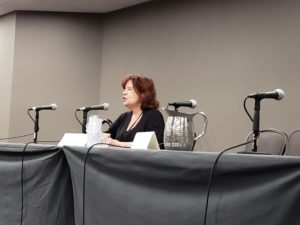 This panel was a delight, made more so because the interviewer, Jack Skillingstead, is Nancy Kress’ husband so there was a lot of fun with questions like “What’s for dinner?” I have read a few things of hers, notably Beggars in Spain, but she never was one of my top gotos. That’s changed after this panel. She’s won six Nebulas, two Hugos, and a smattering of other awards and runs the Clarion Workshop…or has some major doings with it, I’m not sure. She grew up rather isolated in northern New York (having lived there for four years, I can empathize) and thought all writers were dead, like Alcott. She did not see any scifi until she was 14 yo. She had a boyfriend who was a concert pianist and she would hang out adoringly at his piano while he practiced. But she was tone deaf and drifted over to his Dad’s bookshelves, where she found Clarke’s Childhood’s End. She didn’t want to be a writer, wanted to be a teacher and so did, 4th Grade.
This panel was a delight, made more so because the interviewer, Jack Skillingstead, is Nancy Kress’ husband so there was a lot of fun with questions like “What’s for dinner?” I have read a few things of hers, notably Beggars in Spain, but she never was one of my top gotos. That’s changed after this panel. She’s won six Nebulas, two Hugos, and a smattering of other awards and runs the Clarion Workshop…or has some major doings with it, I’m not sure. She grew up rather isolated in northern New York (having lived there for four years, I can empathize) and thought all writers were dead, like Alcott. She did not see any scifi until she was 14 yo. She had a boyfriend who was a concert pianist and she would hang out adoringly at his piano while he practiced. But she was tone deaf and drifted over to his Dad’s bookshelves, where she found Clarke’s Childhood’s End. She didn’t want to be a writer, wanted to be a teacher and so did, 4th Grade.
During her first marriage, she was out in the country taking care of Irish twins…Irish twins? What’s that? Her husband was gone all day and at school at night so she began writing. Her first story was accepted by Galaxy…right before it went bankrupt. Every other writer in America knew it was going under and had stopped sending them stories, which probably helped her get accepted, but it took her three years to get paid the $105.00. While she was taking night courses, she met Judith Merril. Kress has written 136 stories, many of them novellas. Beggars is her best known and she wrote it out of jealousy of those who don’t need much sleep because she does. Her favorite of her novellas is Fountain of Age, and said she didn’t like all of her stories. I noted a slight tone of regret in her voice when talking about Beggars. I suspect she’s already heard enough about how good that story is and doesn’t want to be a one trick pony. Her first stories were lush fantasies, but she became hard scifi as she went along. Can’t take everything with you on a journey. Her first novel was Prince of Morning Bells, which she described as picaresque. She sent it to Ursula Leguin’s agent and the only reason he bothered was due to her short stories. Theodore Sturgeon gave it a good review. She has had a haphazard career, nothing planned, writing things that lit a spark within her, like a character or an idea. Her favorite author is Jane Austen and she does not understand why people don’t read fiction because the brain is wired to understand the world in stories. Her older son, though, reads only non-fiction: “Why would I read something that didn’t happen?”
The Dispossessed was the first scifi novel she read where the characters were rounded. Scifi up to that point was under the thumb of Clarke and Asimov and others who believed only in ideas, not characters. Asimov actually wrote an essay called The Little Tin God of Characterization.
Kress went to the Sycamore Hill workshop run by Bruce Sterling, who is not a tactful man. He described the novella she brought as “rearranging decorations on a moldy scifi cake.” He called it a series of tropes and said she had not considered economics, what the haves owe the have-nots. So she rewrote it into Beggars of Spain.
She really hates scifi movies because they get everything wrong. Apparently the only things that can escape a black hole are Hawking radiation and Michael McConaughey.
- By contrast, the Guest of Honor interview of Alyssa Wong was not a delight. It was like watching an episode of The View. I guess. I never saw an episode of the View but I imagine it is like this. At one point, I thought Wong and the interviewer would braid each other’s hair. Yes, yes, generation gap, I freely admit. But it was off-putting and not a big motivator for me to read anything Wong has written. Which I have yet to do.
- Gravity Waves. Inge Heyer.
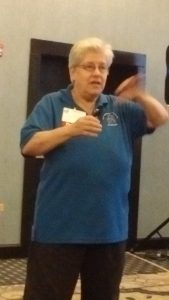 I love Dr. Heyer’s presentations. Last year, it was the solar eclipse and this year, gravity waves. How cool. Einstein told us 100 years ago that they existed. And it’s simple, really: if matter moves, you’re going to get waves, just like a boat moving through water. Matter tells spacetime how to curve, and objects moving through space follow that curve. Think of a roulette ball. Saturn is the least dense planet in our solar system. It can actually float in water, if you could get a tub big enough. Run-of-the-mill gravity waves are too slight for us to detect. You need something really big, like a collision of two black holes or a neutron star going off, something like that, to produce a gravity wave powerful enough to notice. At least, at a distance. If one went off next door, we’d know it because life would end. Fortunately, there’s nothing powerful enough close enough to us to produce that magnitude of a wave, but it does make detecting one problematic because the likeliest candidates are so far away, outside our galaxy. Hence, the LIGO project, interferometers built far enough apart that a real gravity wave can be verified and not just be a truck driving by. The buildings contain mirrors suspended from pendulums and they’re looking for the “chirp,” that exact moment when two black holes merge, followed by the “ringdown.” There have been two confirmations so far of gravity waves, and we’re working on four more. One of them came from the Magellanic Clouds and looks like a black hole merge. When neutrons collide they create heavy elements like gold and silver. One such collision could create as much gold as 10x the mass of the moon. Yes, this all sounds scattered but that’s because I’m giving you the treatment from my notes, which are kind of random. If you want a better take on this, look at my review of Govert Schilling’s Ripples in Spacetime. Quite a pleasure to find out that Dr. Heyer and Schilling are acquaintances.
I love Dr. Heyer’s presentations. Last year, it was the solar eclipse and this year, gravity waves. How cool. Einstein told us 100 years ago that they existed. And it’s simple, really: if matter moves, you’re going to get waves, just like a boat moving through water. Matter tells spacetime how to curve, and objects moving through space follow that curve. Think of a roulette ball. Saturn is the least dense planet in our solar system. It can actually float in water, if you could get a tub big enough. Run-of-the-mill gravity waves are too slight for us to detect. You need something really big, like a collision of two black holes or a neutron star going off, something like that, to produce a gravity wave powerful enough to notice. At least, at a distance. If one went off next door, we’d know it because life would end. Fortunately, there’s nothing powerful enough close enough to us to produce that magnitude of a wave, but it does make detecting one problematic because the likeliest candidates are so far away, outside our galaxy. Hence, the LIGO project, interferometers built far enough apart that a real gravity wave can be verified and not just be a truck driving by. The buildings contain mirrors suspended from pendulums and they’re looking for the “chirp,” that exact moment when two black holes merge, followed by the “ringdown.” There have been two confirmations so far of gravity waves, and we’re working on four more. One of them came from the Magellanic Clouds and looks like a black hole merge. When neutrons collide they create heavy elements like gold and silver. One such collision could create as much gold as 10x the mass of the moon. Yes, this all sounds scattered but that’s because I’m giving you the treatment from my notes, which are kind of random. If you want a better take on this, look at my review of Govert Schilling’s Ripples in Spacetime. Quite a pleasure to find out that Dr. Heyer and Schilling are acquaintances.
- How to Remember Everything. Lawrence M. Schoen. I’d tell you more about this seminar, but I forgot. Yuk yuk. Been waiting all day to say that. John Jacob Astor, holding a teddy bear with a golf ball for an eye and wearing a rose with a caterpillar on it and smoking a cigar, is frowning at Crazy Horse killing a buffalo, while a ceiling fan holding mushrooms spins overhead. He’s waiting to escape on a hot air balloon made out of the Declaration of Independence as the iceberg is hit and the sand castle on top falls. So it’s to the moon and its fire hydrant opened with a can opener to wash away a sundae on top of an Aztec calendar into the mouth of a husky. I think I’m missing four or five, but that’s pretty good after a month.
Danielle and her husband, Michael, are my two favorite people at Capclave although they are far too busy to do much more than exchange greetings and gossip when I pop around. So I jumped at the chance to take a basic book design workshop she put on because she knows what she’s doing. I am trying my own hand at formatting the Frank Vaughn trilogy and could use some tips. She worked publishing for 25 years, the past few with Dark Quest Books, which died at its own hands. I’d love to hear that story. It was a good workshop and I learned that I don’t have a clue what I’m doing so maybe I’m going to hire a pro.
I went to the Awards Ceremony as standard and talked with some people and bought a couple of books, one I didn’t want but I like the author so there’s that. I got Nancy Kress to sign a couple of her short stories in a couple of anthologies I have, one of which
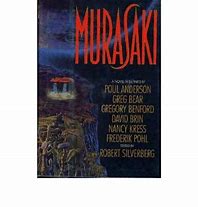 already has Greg Bear’s signature. Two more to go, that is, two more still living. I went to bed, got up on Sunday and, ya know, I’m done, so I went home.
already has Greg Bear’s signature. Two more to go, that is, two more still living. I went to bed, got up on Sunday and, ya know, I’m done, so I went home.
But not before buying a ticket for next year. They’ve got Robert Sawyer as the Guest of Honor.
Oh boy.

